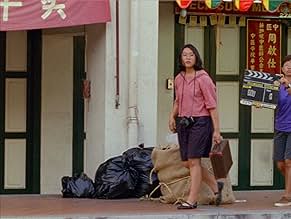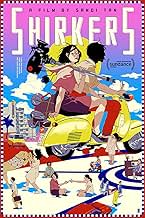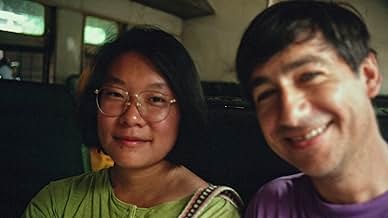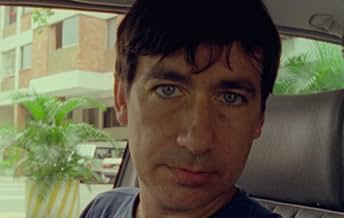NOTE IMDb
7,3/10
5,9 k
MA NOTE
Ajouter une intrigue dans votre langueA woman explores the events surrounding a film she and her friends began making with a mysterious stranger decades ago.A woman explores the events surrounding a film she and her friends began making with a mysterious stranger decades ago.A woman explores the events surrounding a film she and her friends began making with a mysterious stranger decades ago.
- Réalisation
- Scénario
- Casting principal
- Récompenses
- 8 victoires et 31 nominations au total
Jasmine Kin Kia Ng
- Self
- (as Jasmine Ng)
Georges Cardona
- Self
- (images d'archives)
- (non crédité)
Avis à la une
A director explores the myth of Singapore's independent cinema: Shirkers, a film made by her and her friends, with the help of a mysterious man.
The atmosphere of this documentary is very interesting, mixing drama with the mood of a serial killer tv show.
It's a well-structured portrait of a young woman dreams, the ambition to change the concept of cinema, in a country with strong censorship and restrictions, as was Singapore in the 90s, and how someone with a perverse and vicious mind can ruin a so beloved project, and traumatize everyone involved.
Some critics and general public think it's pretentious, I disagree with that opinion, it's not intended to increase the protagonist/director's (Sandi Tan) ego, but rather to show how a group of creative minds can be manipulated when they are not yet mature enough to realize how real life works.
The atmosphere of this documentary is very interesting, mixing drama with the mood of a serial killer tv show.
It's a well-structured portrait of a young woman dreams, the ambition to change the concept of cinema, in a country with strong censorship and restrictions, as was Singapore in the 90s, and how someone with a perverse and vicious mind can ruin a so beloved project, and traumatize everyone involved.
Some critics and general public think it's pretentious, I disagree with that opinion, it's not intended to increase the protagonist/director's (Sandi Tan) ego, but rather to show how a group of creative minds can be manipulated when they are not yet mature enough to realize how real life works.
This documentary came highly recommended from sources I trust and is either praised to the rafters or leaves the viewer completely indifferent. I can understand why people clicked with this movie; I'm not confused why they enjoyed it but the euphoric reviews baffle me. For my part I found it sappy and trivial.
The documentary follows a woman, talking 20 years on, trying to piece together a lost film from her childhood in Singapore. The result is it's terribly self-important for someone who made two short films. Great documentaries, no matter how intimate or grand the subject, convince the viewer they're talking about something important. This element is missing. The film they were making didn't even look promising. To me it's no less vain and uninteresting to watch your average student filmmaker wax lyrical about their creative process but somehow this has more importance ascribed to it because... it's an older person saying it? There are great examples of documentaries about personal drama, about relationships, about the making of movies, yet this one lacked the punch and relevance of -any- of those.
The documentary also mentions Werner Herzog's film Fitzcarraldo - that film spawning the sweeping making-of documentary Burden of Dreams. Unintentionally this only serves to remind me of a filmmaker who actually did something noteworthy with their craft.
I will say as a documentary itself, it has a pleasing aesthetic and I can find no real technical faults. This is perhaps owing to the original film's film stock that nowadays evokes nostalgia in its viewers. This film also benefited from its audience seeking it out; it mainly attracted people who would enjoy this and I thought I'd be in that group. I'd be interested to see how a larger audience would react to this.
Ultimately it's the life story about someone who's not that interesting to listen to; a tale of a friendship that's not endearing; a making-of of a movie that didn't look good to begin with. Although what happened is terrible and unjust, it must unfortunately be admitted that the film world was at no great loss without that film and probably wouldn't be without this one.
The documentary follows a woman, talking 20 years on, trying to piece together a lost film from her childhood in Singapore. The result is it's terribly self-important for someone who made two short films. Great documentaries, no matter how intimate or grand the subject, convince the viewer they're talking about something important. This element is missing. The film they were making didn't even look promising. To me it's no less vain and uninteresting to watch your average student filmmaker wax lyrical about their creative process but somehow this has more importance ascribed to it because... it's an older person saying it? There are great examples of documentaries about personal drama, about relationships, about the making of movies, yet this one lacked the punch and relevance of -any- of those.
The documentary also mentions Werner Herzog's film Fitzcarraldo - that film spawning the sweeping making-of documentary Burden of Dreams. Unintentionally this only serves to remind me of a filmmaker who actually did something noteworthy with their craft.
I will say as a documentary itself, it has a pleasing aesthetic and I can find no real technical faults. This is perhaps owing to the original film's film stock that nowadays evokes nostalgia in its viewers. This film also benefited from its audience seeking it out; it mainly attracted people who would enjoy this and I thought I'd be in that group. I'd be interested to see how a larger audience would react to this.
Ultimately it's the life story about someone who's not that interesting to listen to; a tale of a friendship that's not endearing; a making-of of a movie that didn't look good to begin with. Although what happened is terrible and unjust, it must unfortunately be admitted that the film world was at no great loss without that film and probably wouldn't be without this one.
I like the edit, the footages, the soundtrack, I feel the nostalgic the point of view and what the writer want to tell us, but I think it's misled. The most interesting part about the story is about George, what is his motives? What's he really do? Why he did it? We don't really have an answer for that. The documentary revolves around Sandi and her lost film, not George. I think George is a very interesting people and they didn't dig deeper, instead they tell you something that you less care about.
I heard the Sandi Tan interview on Fresh Air and was intrigued by Shirkers. Went into it with high expectations and thinking I knew what to expect, but was let down as I watched it unfold.
Tan narrates a film that is about her which includes video made by teenagers decades ago, a lot of people talking about Tan, and uninteresting storytelling.
It's a documentary with the seriousness and importance of a historic figure but the subject is a film critic/film maker describing this one mildly interesting thing that happened to her.
The premise was interesting, but it fell apart under the weight of her own self-importance.
Tan narrates a film that is about her which includes video made by teenagers decades ago, a lot of people talking about Tan, and uninteresting storytelling.
It's a documentary with the seriousness and importance of a historic figure but the subject is a film critic/film maker describing this one mildly interesting thing that happened to her.
The premise was interesting, but it fell apart under the weight of her own self-importance.
"Henceforth, audience's curiosity is sizably whetted, and Tan's ensuing quest of "who is Georges Cardona" spirits us away to Cardona's hometown, interviewing his acquaintances and ex-wife (whose image is gingerly pixelated and only referred as "the widow"), and discloses a vague picture what a man he was, Nosferatu is the ostensible consensus: a fabulist who is envious of the achievement of his protégés, which he is not above to undermine at his convenience. Georges makes for such a fascinating case of mental complexity, the first impression he makes on others: emitting congeniality that incongruent with the cold glint in his eyes, might be the best encapsulation, however, SHIRKERS seem to pull punches in burrowing deeper into the truth (a half measure in our post-truth paranoia), whether it is from Tan's own equivocal interrelation with Georges, or the widow's conspicuous "I don't know anything about it" disclaimer."
Le saviez-vous
- AnecdotesIn 2018, Sandi Tan premiered her film at the Sundance Film Festival and earned the World Cinema Documentary Directing Award. She was the second Singapore-born filmmaker to win. (The first went to another Tan: Kirsten Tan, for Pop Aye, the previous year.)
- ConnexionsFeatures La blonde et moi (1956)
Meilleurs choix
Connectez-vous pour évaluer et suivre la liste de favoris afin de recevoir des recommandations personnalisées
- How long is Shirkers?Alimenté par Alexa
Détails
- Date de sortie
- Pays d’origine
- Site officiel
- Langue
- Aussi connu sous le nom de
- Shirkers: Bộ Phim Bị Đánh Cắp
- Sociétés de production
- Voir plus de crédits d'entreprise sur IMDbPro
- Durée1 heure 37 minutes
- Couleur
- Rapport de forme
- 1.78 : 1
Contribuer à cette page
Suggérer une modification ou ajouter du contenu manquant























